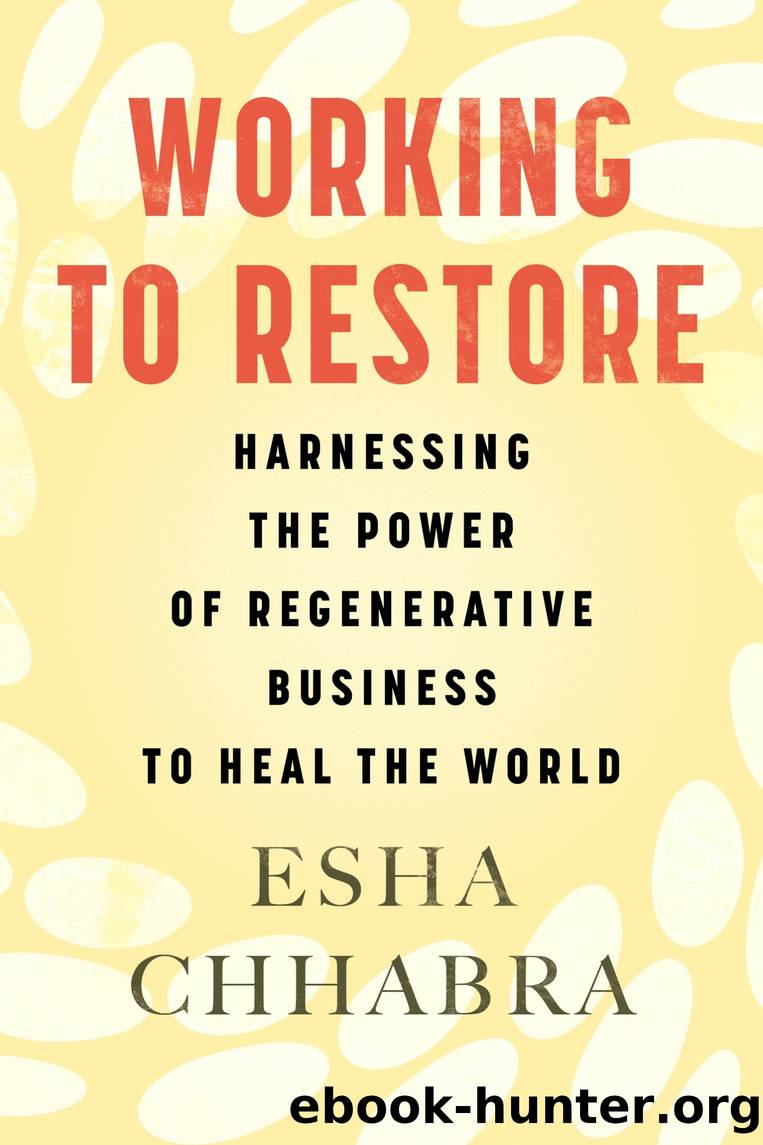Working to Restore by Esha Chhabra

Author:Esha Chhabra [Chhabra, Jarvis R.]
Language: eng
Format: epub
Publisher: Beacon Press
Published: 2022-08-15T00:00:00+00:00
ADDING THE FEMALE VOICE
London-born Sophi Tranchell saw this firsthand on her trips to Ghana as she built Divine Chocolate, a partially farmer-owned chocolate company. Raised by parents and grandparents who were campaigners for social issues, Tranchell developed a passion for social justice in her teens, which compelled her to protest against apartheid by campaigning about the choice of goods and services people buy. In 1999, she was recruited as the managing director for a new chocolate company. Divine Chocolate was created when Twin Trading, a UK-based nonprofit that had already helped build Cafédirect, and a Ghanaian cocoa farmersâ cooperative, Kuapa Kokoo, collaborated to establish a chocolate brand that had its roots in fair trade and would give consumers a new way to express their values with their purchases.
âAt that time, awareness around fair trade was under 10 percent,â Tranchell says. âNow, itâs at 90 percent in Great Britain. Young people want to know more about where their products come from, [and] how and what change theyâre making in communities.â
This new consciousness has worked in Divine Chocolateâs favor: it is 44 percent owned by cocoa farmers in Ghana, and itâs been nudging women into leadership positions in the cooperative and on the companyâs board of directors since the beginning.
Divine Chocolate works primarily with Kuapa Kokoo, a cooperative of around one hundred thousand farmers of whom one-third are women. Since its founding in 1993, the cooperative has encouraged women to be a part of business discussions from the outset. If five members were on a local committee in the cooperative, two would need to be women. Over the years, that nurturing of womenâs voices and leadership has grown. Hundreds of women have stepped up to leadership roles in their own districts, ultimately serving on the National Executive Committee and even becoming presidents and vice presidents of the organization.
âThirty-five percent of membership [in Kuapa Kokoo] is women; probably only 30 percent of cocoa farmers in the country are women. To be a member, you have to own a farm, so itâs impressive to see so many women in the cooperative. Thatâs how you shift culture,â Tranchell explains.
In 2007, Tranchell invited a longtime cocoa farmer, Comfort Kumeah, to join her in Washington, DC, to announce the launch of the company in the United States. Kumeah, who had not traveled much beyond her village in Ghana, was given the opportunity to speak and share her story.
Kumeah, sixty, the mother of five children, joined Kuapa Kokoo more than a decade ago when she, like many other farmers, noticed that the scales the cooperative used to measure the cocoa gave an honest weightâthey werenât designed to cheat the farmer of her income by underweighing, as was often the case. âIf someone would have told me that twelve years later, you will be the national secretary of Kuapa and chair of the Farmersâ Union, I would have laughed,â she says. Kumeah also has an educational role, speaking to women in the cooperative about becoming active and diversifying their income streams in the off-seasonâbecause cocoa is a seasonal crop.
Download
This site does not store any files on its server. We only index and link to content provided by other sites. Please contact the content providers to delete copyright contents if any and email us, we'll remove relevant links or contents immediately.
Bad Blood by John Carreyrou(5782)
Principles: Life and Work by Ray Dalio(5335)
Rich Dad Poor Dad by Robert T. Kiyosaki(5167)
Management Strategies for the Cloud Revolution: How Cloud Computing Is Transforming Business and Why You Can't Afford to Be Left Behind by Charles Babcock(4135)
The Confidence Code by Katty Kay(3576)
Thinking in Bets by Annie Duke(3541)
Playing to Win_ How Strategy Really Works by A.G. Lafley & Roger L. Martin(3024)
American Kingpin by Nick Bilton(2984)
Delivering Happiness by Tony Hsieh(2926)
Project Animal Farm: An Accidental Journey into the Secret World of Farming and the Truth About Our Food by Sonia Faruqi(2667)
Brotopia by Emily Chang(2594)
I Live in the Future & Here's How It Works by Nick Bilton(2532)
Mastering Bitcoin: Programming the Open Blockchain by Andreas M. Antonopoulos(2518)
The Power of Habit by Charles Duhigg(2497)
The Content Trap by Bharat Anand(2496)
The Marketing Plan Handbook: Develop Big-Picture Marketing Plans for Pennies on the Dollar by Robert W. Bly(2421)
The Tyranny of Metrics by Jerry Z. Muller(2407)
Building a StoryBrand by Donald Miller(2368)
Applied Empathy by Michael Ventura(2334)
